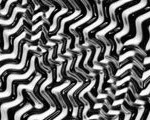Category Science & Technology
Canadian science radio producer to visit campus
Jim Handman, executive producer of the highly acclaimed Canadian Broadcasting Corporation science radio show "Quirks & Quarks," will spend the week of Oct. 6-10 on campus as the fall semester University of Wisconsin–Madison Science Writer in Residence. Read More
Lava flows reveal clues to magnetic field reversals
Ancient lava flows are guiding a better understanding of what generates and controls the Earth's magnetic field - and what may drive it to occasionally reverse direction. Read More
Professor brings sight to people around the world
If you’ve met Suresh Chandra, you’ve likely been enlisted in his crusade to end blindness. Read More
Global population lecture opens Nelson Institute series
Joel Cohen will give a free public lecture, “Global Population and the Global Environment to 2050,” at 7 p.m. Tuesday, Oct. 7, in 165 Bascom Hall. The event opens the fourth year of the Gaylord Nelson Lecture Series, hosted by the Nelson Institute for Environmental Studies. “Population and Resources” is the theme for 2008–09. Read More
Canadian science radio producer named Science Writer in Residence
Jim Handman, executive producer of the highly acclaimed Canadian Broadcasting Corp. science radio show “Quirks & Quarks,” will spend the week of Oct. 6–10 on campus as the fall Science Writer in Residence. Read More
Family medicine increases visibility through YouTube channel
The Department of Family Medicine (DFM) has further broadened its online presence by launching an expanded channel, http://www.youtube.com/WIFamilyMedicine. Read More
Conference targets solutions for lakes
People who care about Dane County’s tainted lakes will consider the options in a daylong conference on Friday, Oct. 10, at Monona Terrace Community and Convention Center. Read More
Q&A: A broad vision for cross-college biology education
As one who balances scientific interests in microbes and climate change with a passion for human development, associate soil science professor Teri Balser knows a thing or two about bridging diverse disciplines and perspectives. Who better, then, to lead the Institute for Cross-College Biology Education? Read More
Feyzi named new director of Physical Sciences Laboratory
Farshid Feyzi takes over this week as director of the Physical Sciences Laboratory (PSL), the University of Wisconsin–Madison's in-house engineering, manufacturing and project consultation center. Read More






